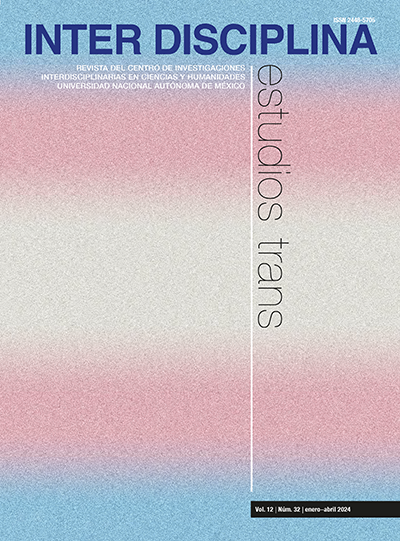New materialism and new biopolitics. Sexual difference and the trans body
Main Article Content
Abstract
This text aims to show the way in which the new feminist materialism (NFM) promotes a new biopolitics in trans bodies under the discourse of sexual difference of the philosopher Elizabeth Grosz (1994 and 2011). The characterization that Grosz makes of sexual difference, recovering the work of the philosopher Luce Irigaray, presents it as immutable and self-evident in such a way that trans bodies cannot cross it. Despite the fact that the NFM has been well received within a certain part of feminist thought, transfeminism and trans studies for its epistemic and political promises, Grosz’s work shows how the biopolitics that are promised to have been left behind reappears, in fact, under the new ways of conceiving the body and matter.
Downloads
Article Details
Citas en Dimensions Service
References
Alaimo, S., Hekman, S. y Hekman, S. J. (eds.). 2008. Material feminisms. Indiana University Press.
Barad, K. 2008. Posthumanist performativity: toward an understanding of how matter comes to matter. En S. Alaimo, Hekman, S. y Hekman, S. J. (eds.), Material feminisms. Indiana University Press, 120-154.
Beauchamp, T. C. 2017. Transgender matters. En Gender: Matter. Macmillan Reference USA, 65-77.
Braidotti, R. 2004. Feminismo, diferencia sexual y subjetividad nómade, vol. 110. Barcelona: Gedisa.
Cooper, Melinda. 2011. Life as surplus: biotechnology and capitalism in the neoliberal era, Washington: University of Washington Press.
Coole, D. y Frost, S. 2010. Introducing the new materialism. En Coole, Diana y Samantha Frost (eds.), New materialisms: ontology, agency, and politics. Durham: Duke University Press, 1-44.
Davis, N. 2009. New materialism and feminism’s anti-biologism: A response to Sara Ahmed. European Journal of Women’s Studies, 16(1): 67-80.
De Benito, Emilio. 2018). La OMS saca la transexualidad de la lista de enfermedades mentales. El País. https://elpais.com/internacional/2018/06/18/actualidad/1529346704_000097.html.
Foucault, M. 2000. Defender la sociedad. México: FCE.
Foucault, M. 2014. Historia de la sexualidad, vol. 1. La voluntad de saber. México: Siglo XXI.
Guerrero Mc Manus, Siobhan. 2018. El pánico y tus ojos que me sueñan: etnografía afectiva de un tránsito de género. En Pons Rabasa, Alba y Siobhan Guerrero Mc Manus, (comps.): Afecto, cuerpo e identidad. Reflexiones encarnadas en la investigación feminista. Ciudad de México: UNAM, 99-98.
Grosz, E. 1994. Volatile bodies. Toward a corporeal feminism. St. Leonards, NSW: Indiana University Press.
Grosz, E. 2011. Becoming undone: Darwinian reflections on life, politics, and art. Durham: Duke University Press.
Haraway, Donna. 1995. Manifiesto para cyborgs: ciencia, tecnología y feminismo socialista a finales del siglo XX. En Donna Haraway, Ciencia, cyborgs y mujeres. La reinvención de la naturaleza. Madrid: Gráficas Rógar, 251-311.
Hausman, B. 1995. Changing sex: transsexualism, technology, and the idea of gender. Durham: Duke University Press.
Kirby, V. 1991. Corporeal habits: addressing essentialism differently. Hypatia, 6(3): 4-24.
Koyama, Emi. 2001. The transfeminist manifesto. https://eminism.org/readings/pdf-rdg/tfmanifesto.pdf.
Lane, R. 2016. Reading trans biology as a feminist sociologist. Transgender Studies Quarterly, 3(1-2): 185-191.
Lemke, T. 2011. Biopolitics. An advanced introduction. Nueva York: New York University Press.
Meißner, H. 2016. New material feminisms and historical materialism – A diffractive reading of two (ostensibly) unrelated perspectives. En Mattering: feminism, science, and materialism. Nueva York: New York University Press, 43-57.
Meyerowitz, Joanne. 2004. How sex changed: a history of transsexuality in the United States. Harvard University Press.
Misse, M. y Coll-Planas, G. 2010. El género desordenado: críticas en torno a la patologización de la transexualidad. Barcelona: Egales.
Muñoz Contreras, Leah. 2018. Materializar lo trans. Un diálogo entre la nueva biología y el nuevo materialismo feminista. En Guerrero Mc Manus, S., Leah Muñoz Contreras y Silvia Soler Casellas (coords.), Afecto, cuerpo e identidad. Reflexiones encarnadas en la investigación feminista. México: UNAM.
Pitts-Taylor, V. 2016. Mattering: feminism, science, and materialism. Nueva York: New York University Press.
Preciado, P. B. 2016. Manifiesto contrasexual, vol. 702. Barcelona: Anagrama.
Preciado, P. B. 2020. Testo yonqui, vol. 542. Barcelona: Anagrama.
Rabinow, P. y Rose, N. 2006. Biopower today. BioSocieties, 1(2): 195-217.
Raymond, J. 1979. The transsexual empire. the making of the she-male. Londres: Athene Series.
Roughgarden, J. 2013. Evolution’s rainbow: diversity, gender, and sexuality in nature and people. California: University of California Press.
Rose, N. 2007. The politics of life itself. Biomedicine, power, and subjectivity in the twenty-first century. Princeton University Press.
Salamon, G. 2010. Assuming a body: transgender and rhetorics of materiality. Columbia University Press.
Stephano, O. 2018. Irreducibility and (trans) sexual difference. Hypatia, 34(1): 141-154.
Stone, S. 1987. The empire strikes back: A posttranssexual manifesto. https://uberty.org/wp-content/uploads/2015/06/trans-manifesto.pdf.
Stone, A. 2006. Luce Irigaray and the philosophy of sexual difference. Cambridge University Press.
Stone, A. 2007. An introduction to feminist philosophy. Cambridge, UK: Polity.
Stryker, S. 2014. Biopolitics. Transgender Studies Quaterly, 1(1-2): 38-42.
Stryker, S. 2016. Another dream of common language: an interview with Sandy Stone. Transgender Studies Quarterly, 3(1-2): 294-305.
Stryker, S. y Bettcher, T. M. 2016. Introduction trans/feminisms. TSQ: Transgender Studies Quarterly, 3(1-2): 5-14.
Van Midde, M. 2016. A new materialist approach to transmasculinity. Doctoral dissertation, Masters dissertation. Lund: Lund University.
Van Midde, M., Virtù, L. V. y Cielemęcka, O. 2018. Editorial–Trans materialities. GJSS Graduate, 14(2): 4-9.
Weasel, L. H. 2016. Embodying intersectionality. Mattering: Feminism, Science, and Materialism, 1: 104.

Esta obra está bajo una Licencia Creative Commons Atribución-NoComercial-SinDerivar 4.0 Internacional.





